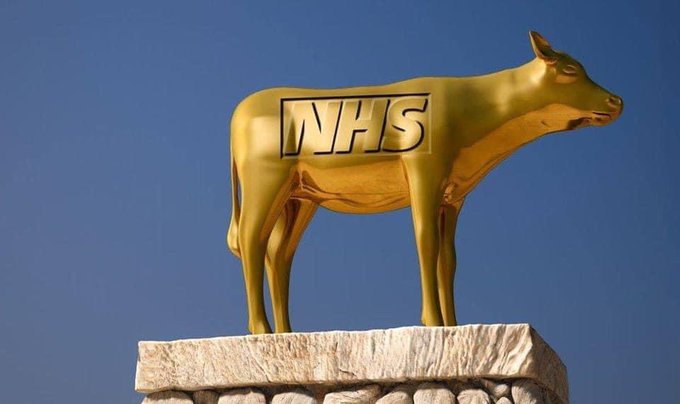There’s recently been a very interesting Twitter thread by a senior member of the NHS management about the current Covid situation. It was written by Chris Hopson the CEO of NHS Providers and is pretty nuanced in its findings and talks about both the good and the bad of the current situation. It’s worth reading the whole thread which can be found HERE but there are a couple of interesting things that struck me as very noteworthy in what Mr Hopson was saying.
The first is that, so far, the Omicron variant of Covid does not seem to be causing the same pressures on healthcare as early waves and other variants did. Also the various Covid vaccines despite their alleged fall of in effectiveness appear to have worked well in preventing serious illness and therefore stressing healthcare resources. The second is that much of the pressure now seems not be coming from increased numbers of severely ill patients but from staff having to be absent because they have contracted Covid or tested positive for it.
But what caught my eye especially was Mr Hopson’s comment on what he called ‘incidental infections’. These are he said cases where someone was admitted to hospital for a non-covid related issue but subsequently tested positive for Covid.
Mr Hopson said:
Talking to trust chief executives this morning, what’s very interesting is how many are talking about number of asymptomatic patients being admitted to hospital for other reasons and then testing positive for covid. Some are describing this as ‘incidental covid’… 7/19
In the words of one hospital chief executive in the South West this morning: “we’ve seen a 30% increase in covid positive inpatient numbers compared to 7 days ago. But largest proportion are incidental finding on admission, so covid-19 is not the reason for admission….11/19
Of course some of those patients could have been positive for Covid prior to admission but may not have been tested until they got to the hospital. However we should not discount the possibility that some or all of these ‘incidental infections’ are infections that are acquired whilst in the hospital.
Knowing how the NHS has been afflicted by scandals related to hospital acquired infections in the past, it is not beyond the bounds of possibility that poor infection control in NHS hospitals is either wholly or partly to blame for the rise in these incidental infections. We have not for decades in Britain had a proper infectious disease isolation hospital service. These were run by the NHS and prior to the NHS being created they were run by local authorities and other bodies. They were scrapped when diseases like TB and Smallpox, which they were for, were effectively controlled by vaccination and antibiotics. The removal of the possibility that those with infectious diseases could be treated separately from those with other medical conditions has meant that Covid patients are treated in the same buildings and by the same staff as non-Covid patients and this increases the risk of hospital acquired infections of Covid.
The NHS has long ceased to be a paragon of cleanliness and infection control which is why there were the various scandals over the years about hospital acquired infections. The problem with having hospitals that are not as clean as they should be or where infection control is less of a priority than it should be is that when an airborne virus, especially an airborne respiratory virus, comes along then it finds dirty hospitals a boon when it comes to the ability to spread.
It would not surprise me one little bit to find, when the inevitable inquiries into Covid take place, that the poor cleanliness of NHS hospitals and a failure to plan for an outbreak of infectious disease has contributed to the deaths of NHS patients from Covid. The NHS has a surfeit of useless managers pushing the diversity cult yet a dearth of people pushing mops and buckets around or cleaning other surfaces or policies that properly segregated those with infectious diseases. Covid has exposed the failings of Britain’s purely state run socialistic healthcare system and I believe will increase the volume and number of those who wish to see the NHS replaced with something that is better managed but which also is free to the patient at the point of use.






Mr. Hopson and Mr. Hopwood, is that a typo or two people with similar names?
The normal course of this kind of virus is for the newer variants to get progressively less serious. I wonder what the significance of a positive test is in real practical terms. If you test positive without actually feeling ill, are you carrying a more or less harmless strain of the bug or have you just built up enough immunity over time? If it’s the former than people testing positive isn’t really a problem. If it’s the latter then you could potentially infect someone and cause them to actually become ill.
Typo corrected.
Yes we do seem to be getting to a situation where the virus is lessening in seriousness. However I can understand those who say wait and see as the UK has a different demographic from South Africa.
I thought that was probably the case. Mr. Hopwood was the guy who designed the engine of the Norton Commando.
LOL. That typo will hopefully teach me the perils of writing, whilst reading other stuff and trying to entertain a small child at the same time.
Given the prevalance of Hospital Acquired Infections before covid, who’d bet against this?
I would not bet against this especially as a few weeks ago the NHS was looking at potential problems with covid infected oxygen distribution systems.